Abstract
Oesophageal disorders can impact locally on food delivery to the stomach while gastric disorders can interfere with reservoir function and chemical digestion. These restrictive disorders prevent anabolism and contribute to catabolism in order to maintain function. However, many oesophago-gastric disorders can impact on the energy balance through their systemic effects such as sepsis or cancer cachexia as two notable examples. These are catabolic disorders and despite adequate intake malnutrition is the end result. Malnutrition is prevalent in most patients with oesophago-gastric disorders particularly in patients with cancers of the oesophagus or stomach. In addition, the effects of therapeutic modalities delivered to the oesophagus or stomach such as surgery, chemo and radiotherapy can also influence a catabolic state either directly or indirectly. The local, systemic and therapeutic effects on energy balance have to be addressed by a thorough screening, assessment, appropriate therapy and continuous monitoring of nutritional status. All patients with reduced oral intake and / or weight loss as a result of mechanical or functional obstruction in the oesophagus or stomach should be screened and referred for dietetic assessment and management if appropriate. The overall goal of dietetic therapy in oesophago-gastric disorders is to address the energy imbalance, restore the energy requirements and improve symptoms in order to maintain function and survival.
Keywords: Cancer cachexia, Dumping syndrome, Energy balance, Enteric nutrition, Nutrition, Malnutrition, Risk assessment, Nutritional requirements, Oral nutrition supplements, Parenteral nutrition.
















